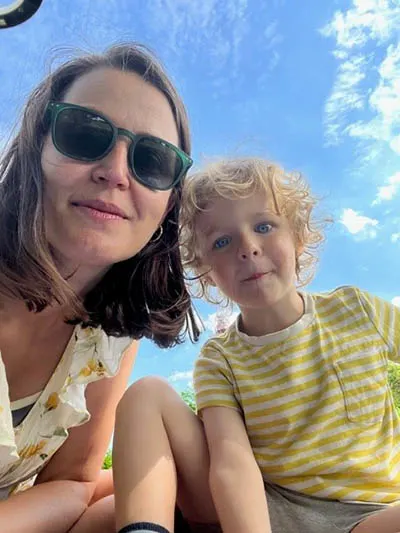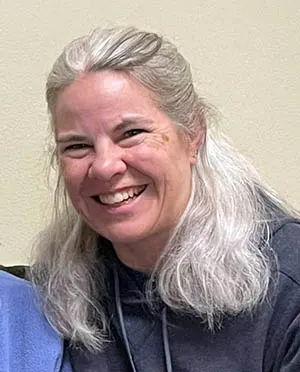Elsevier named a “Best Place to Work for Working Daughters” (and sons)
2024년 10월 28일 | 8분 읽기
저자: Catherine Adenle, Melody Smith-Lopez, Alison Bert, DMA

Our people share their experiences of caregiving at Elsevier (clockwise from left): Jill Mottorn with her family; Richard Nicklin and his son; Susan Ikeda and her mom, and Richard Davies.
This award recognizes companies that support caregivers; here, our people share their personal stories and the impact Elsevier’s culture has had on their lives
Update: Since this article was published on November 23, 2022, we are pleased to once again earn a place among the top 10 Best Places to Work for Working Daughters, alongside industry leaders like Cisco, Morgan Stanley, and Fannie Mae. This recognition is a reflection of our company’s deep commitment to fostering an inclusive, supportive workplace where employees can thrive professionally while caring for their families. Here, Jill Mottorn, Digital Marketing Manager, Americas, writes about her experience at Elsevier, adding to the stories of our colleagues from two years ago, which follow.

Jill Mottorn
“My mom is the Queen of England”
By Jill Mottorn
My Mom is the Queen of England. At dinner one night, she announced to her fellow residents that as their Queen, she needed to lead them to safety before the enemy advanced. In case you were wondering, my mom isn’t the Queen of England — although she is the queen of my heart. She lives with Alzheimer’s disease. When we first received her diagnosis in 2015, I was prepared for memory loss, but I was ignorant of the changes in behavior, mood swings and delirium, which has resulted in frequent trips to the hospital to address the psych issues.
Whether it’s spending time with her in the hospital, meeting with caregivers, attending doctor appointments or participating in family support meetings, Elsevier’s support for working daughters (and Sons) ensures that I can be active in Mom’s care and still work fulltime.
Prior to this year, I was using my leave to care for my mom — trips to the neurologist, dental appointments, meeting with part-time in-home carers and other appointments and needs all added up, and I blew through my leave bank. As I prepared to take more time away from work when Mom fell and needed surgery, my HR partner, Terry Patton, suggested that I seek elder care and support — she quite strongly advised that we are encouraged to use our leave to unwind, rejuvenate and care for ourselves and use programs such as the elder care to preserve our leave for other necessary wellness and wellbeing reasons. Without Elder Care & Support, as well as the support and flexibility my manager, Natalie Farra, provides, I would have to make a hard decision between being active in Mom’s care and looking for other employment that offered the flexibility that I need. I’m grateful for the tools and support Elsevier provides for family caregivers, and I take pride in knowing that our collective work at Elsevier supports policymakers, funders and researchers who are working towards making Alzheimer’s disease manageable, treatable and preventative.

Jill Mottorn with her mom, Loreen, cousin Jennifer and dog, Chunk.
When her mom fell and broke her hip last year, Susan Ikeda wasn’t ready.
“I had been looking into finding her at-home care just the day before,” recalled Susan, a Senior Editorial Project Manager based in Elsevier’s San Diego, California, office:
I scrambled — the hospital was next, then skilled nursing, and then … I wasn’t sure. I had so much to do, and I wasn’t sure where to go or who to ask. I called my manager, dreading having to tell her I wouldn’t be as present as usual because I had to see my mom everyday (she had dementia and skipping a day was really hard for her).

Susan Ikeda and her mother
Fortunately, Susan’s fears about work were soon allayed:
My manager supported me in ways I didn’t think possible — flextime, empowering me to cancel meetings, and helping me find support in Elsevier. I was so preoccupied with my mom that I didn’t think about checking all that Elsevier has to offer.
Elsevier offers a wide range of support for employees who are caregivers, from formal programs like Modern Family Leave to webinars for health and wellbeing. So we were honored to learn last week that Working Daughter — a community for balancing caregiving and career — named Elsevier to this year’s 10 “Best Places to Work for Working Daughters.”
Other awardees included Adobe, Cisco, Morgan Stanley, and Salesforce. Working Daughter founder Liz O’Donnell commented on the importance of offering inclusive support for employees:
Many companies have programs in place to help workers who are parents, but equally important is supporting workers with parents — the working daughters and sons who care for aging and/or ill family members. We looked for companies that went beyond offering flex time and EAP services. Inclusion on the list sends a strong message that a company understands and supports its employee caregivers.
Under the listing for Elsevier, the paragraph on “what we liked” was long:
Employees have access to a free license to download Headspace, a personal guide to mindfulness offering guided exercises, videos and more. Additionally, stress webinars and online Wellbeing Toolkits that provide tips and resources for stress management are offered. Employees can seek assistance through Bright Horizons Family Assistance for coordination of respite care. Employees can also receive up to 8 weeks of paid time off per year for elder care, or to care for a dependent with special needs or a chronically ill family member through the company’s Modern Family Leave Program.
Supporting caregivers at work is a business imperative. More than 1 in 6 working Americans assist with the care of an elderly or disabled family member, relative or friend, according to Working Daughter. Working children often suffer work-related difficulties and switch to less demanding jobs, take time off or quit work altogether due to their dual roles. As a result, they suffer a loss of wages and benefits.
Elsevier supports our employees who are caregivers, and we are continuously striving to ensure that our organization makes care and career compatible.
Given the importance of our employees benefiting from our culture of flexible working, remote working, and wellness and wellbeing, we wanted to highlight how a few of our people have balanced caring for relatives while they continue to focus on their careers.
“Nobody at Elsevier ever questioned my need to have a more flexible schedule and work from home.”
Maria Aguilar’s son was just 2 when he was diagnosed with autism.
“I found the news scary, mostly due to my lack of knowledge on the topic,” recalled Maria, Associate Director of Customer Insights, based in London.
Then she would have to tell her manager. Fortunately, their conversation put her at ease.
My manager at the time made me feel completely at ease disclosing my personal situation, and was very encouraging of my need to process the news and take some time away from the office. That support has continued as we have had to adapt to a new life full of therapists coming to our home to help him with his speech and motor skills, as well as medical appointments.

Maria Aguilar and her son
Nobody at Elsevier ever questioned my need to have a more flexible schedule and to work from home so that my son can have therapy. I have felt empowered to continue to push myself at work due to the respect and understanding I’ve received from my colleagues. During the past 3 years, I’ve grown to embrace my son’s neurodivergence, and I’ve felt incredibly supported in the process by Elsevier.
Recently, her son started school, and the experience has been positive, Maria said:
He’s a little chatterbox who loves reading, and he’s starting to make friends.
If it wasn’t for Elsevier’s flexible working policies, our D&I culture and my amazing colleagues, I can confidently say I wouldn’t have been able work at the same capacity or give my son the early support he required. For that I will always be grateful.
“I’m super-proud to tell my 7-year-old about the work we do.”
As a single dad, Richard Nicklin knows what it means to balance career and caregiving. As a Senior Talent Acquisition Manager based in the UK, he says he’s fortunate to work for a company he’s proud of:
As a single parent, the time spent with my son is of paramount importance, but equally is doing a job that makes a real difference. I’m super-proud to tell my 7-year-old that the work Elsevier does is helping to cure the world’s diseases.
Elsevier allows me to work flexible hours that help me to enjoy family life to its fullest. I’m genuinely so proud to be working for an organization that isn’t all about profit but more about making employees truly experience work-life balance while they help do the work that makes the world a better place.
Caring for a spouse and parent

Richard Nicklin and his son
Richard Davies, an Operations Director for Digital Transformation based in Oxford, said he’s grateful for the support he received when he found himself caring for his elderly mother as well as his wife, who had cancer:
In both situations, the flexibility and emotional care given by everyone I was working with — and especially my manager at the time — were exemplary. As well as understanding and flexibility by my management, my colleagues stepped in to help progress projects when I was unable to, knowing that in a similar situation I would do the same for them.
Richard’s mother has passed on, and his wife has since recovered. But the culture of caring continues at work:
It’s that sense of mutual support and trust, as well as a caring environment, that makes Elsevier such a great place to work.
“I had resources and support for things I didn’t know I’d need.”

Richard Davies
For Susan Ikeda, the support she received allowed her to spend time with her mother in her final days.
Knowing I could leave in the middle of the day to sign papers to get my mom into hospice care was wonderful. Being with my mom when she moved from skilled nursing to memory care was comforting. Knowing I could leave at any time to do what had to be done before and after her death freed me from guilt.
My team at Elsevier went the extra mile. They sent me a care package to let me know they were supporting me. The larger group sent an e-card. I had resources and support for things I didn’t know I’d need — all I had to do was ask.
I’m grateful for the people and the company of Elsevier for allowing me time with my mom. I was able to focus on her and her needs.

Susan Ikeda
Of course, anyone who has cared for a loved one knows that the challenges continue after their death — logistical challenges as well as the lingering grief that comes with the passing of a loved one. As Susan recalled:
When she passed away, I was able to take time off to clean and sell her house and take care of all the stuff surrounding a change like that. It’s been almost a year and I still feel the support. This is something we all go through and having the support of the company — a place where I spend most of my time — has helped me with the transition of life.
About Working Daughter
Working Daughter is a community for women and men balancing eldercare, career and more. Working Daughter’s mission is twofold: to make sure no one goes through caregiving feeling alone and to make caregiving and career compatible. The company strives to build awareness of and support for the millions of people caring for aging and ill family members.
About Elsevier
We help researchers, clinicians and engineers tackle the biggest challenges facing humankind. Combining content, data and analytics, we turn information into answers. With a wide range of technology jobs, commercial and business jobs, and graduate jobs, there is a part for everyone to play. We need talented people to help us inspire ground-breaking research.
기여자


